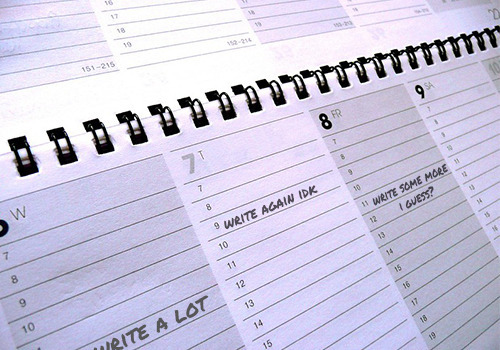4 Tools to Effectively Manage Your Writing Time

Unfortunately, life consists of more than just writing time. It can be challenging to use your time well, but fear not! Today, participant Daniela McVicker shares some great practical tools to help with effective time management:
We all face the issue of spending too much time on straightforward tasks, which is why time management is such a vital skill for any professional, especially if you’re a writer.
There are many reasons one’s time management might be off. Many of us will procrastinate by going down their preferred social media rabbit hole. Others will simply plan their work time improperly. There are things that each of us can improve in our workdays. The great news is that there’s a time management tool that will take of it.
In this article, we’ll take a look at a variety of services that help you work more efficiently and stay on task for longer. Let’s dive right in, shall we?
A central rule of time managementBefore we look into each individual tool that writers will find useful, it’s important to stress that efficient work starts with proper time distribution.
Back in 1955, Cyril Parkinson published an article in The Economist, which would change the way many governments perceive deadlines. It was coined as ”Parkinson’s Law” and here’s the gist of it:
“The amount of time that one has to perform a task is the amount of time it will take to complete the task.”
In a nutshell, you’ll work on a task for at least the time as you dedicate to it. Efficient work starts with setting reasonable deadlines.
Many of the tools we’re going to look at today will take advantage of this law.
1. FocusmateFocusmate is a tool that many writers adore. This tool taps into the peculiarities of human psychology, which allows it to improve your output during a limited amount of time considerably.
After you make an account with the platform, you’ll be able to schedule 50-minute sessions with other people. The protocol of these meetings implies that you provide each other with a detailed list of tasks you’ll be working on during the session, after which you’ll proceed to work in silence. Once the session is over, you’ll both report on the amount of work you’ve managed to get in, which is a potent form of digital accountability.
More importantly, this tool allows you to take advantage of the Parkinson’s Law, by assigning a limited amount of time on detailed and granular tasks, thus maximizing your productivity and managing your time with maximum efficiency.
2. CuckooCuckoo is a very straightforward but highly efficient timer designed for teams and individuals. It allows you to divide your work in increments of various length, allowing to preestablish the amount of time you allocate to a certain task.
Besides merely using it as a personal timer, you can sync your work sessions with your colleagues and teammates for collective accountability.
It has an amazingly intuitive interface and design and can be used both in a browser and as an app on your machine.
3. RescueTimeA large part of optimizing your time distribution is eliminating wastefulness. RescueTime is a great tool to identify the activities that detract from your productivity. It works as a background tracker and provides its users with detailed reports on the amount of time they spend or waste on specific activities during a day of work.
Once you’ve collected enough data on the main culprits of your decreased productivity, you can then start blocking apps that tend to distract you. Considering how intellectually demanding writing is, many reliable writing services have incorporated Rescue Time and similar apps in their daily workflow.
4. FreedomFreedom is somewhat similar to RescueTime in that it allows you to block certain websites and apps during your work time. However, it takes this feature to the next level. You can create different lists of distractors and block entire lists of apps and site on the device that you’re using or across all of your devices, including your smartphone, tablet, and so forth.
The unfortunate truth about social media is that we often intend to open them during working hours. More importantly, we’re rarely aware of the fact that we’re distracted, because… well, because we’re distracted, we simply forgot about the task that we were working on a few moments ago. This is why Freedom is such an indispensable tool in a writer’s arsenal.
Just experimenting with Freedom will provide you with a lot of insight into how mindless everyday distractions can be. So in case you’re looking to minimize the amount of time you’re wasting on sites that are robbing you of your concentration — this is your app. On a similar note, check out an article we published recently on writing with ADHD.
ConclusionWriting is very demanding, which is why distraction and poor time management have to be eliminated from a writer’s workflow as soon as possible. These tools will have an impressive impact on how you allocate time for your writing tasks and how much time you waste on sites that capitalize on it.
Better time management leads to higher productivity and more consistent professional growth.
Now, back to you. What are the tools you use? Why do you use them? How do you use them?

Daniela McVicker is a freelance writer. She has a master degree in English Literature, and she is truly passionate about learning foreign languages and teaching. Daniela works with the students helping them to reveal the writing talent and find one true calling.
>Top image licensed under Creative Commons from photosteve101 on Flickr.
Chris Baty's Blog
- Chris Baty's profile
- 63 followers



